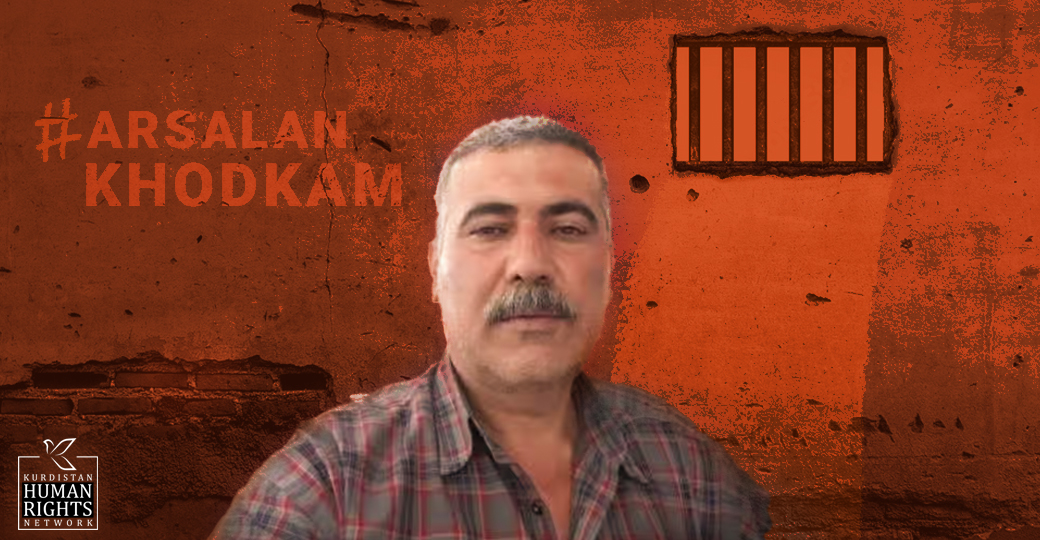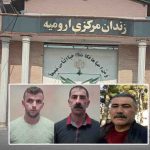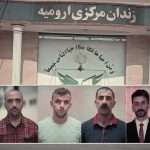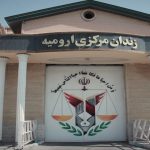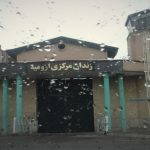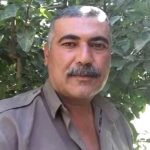Arsalan Khodkam is a former member of the Democratic Party of Iranian Kurdistan (PDKI). In 2002, after parting ways with the party and receiving a “safe conduct” letter, he returned to Iran and began working for the Islamic Revolutionary Guard Corps (IRGC).
Arrest
On 22 April 2018, Khodkam was arrested by the Intelligence Protection Organisation of the IRGC, accused of “espionage” in favour of the PDKI, and was interrogated for 36 days in the IRGC’s 81 Ramadan detention centre at the Al-Mahdi base in Orumiyeh, West Azerbaijan Province, where he was subjected to torture.
To pressure him, security forces also detained his wife, Nashmil Gheytasi.
As a result of physical and psychological torture, Khodkam was coerced into confessing to the allegations made by the Intelligence Protection Organisation of the IRGC regarding his alleged association and espionage for the PDKI.
Judicial Process
Khodkam’s trial was held on 14 July 2018 in Branch One of the Orumiyeh Military Court without the right to a lawyer, and he was sentenced to death on charges of “enmity against God” (moharebeh) and “espionage” in favour of the PDKI.
Following the political prisoner’s appeal against the sentence, the case was referred to Branch 32 of Iran’s Supreme Court for reconsideration, but was upheld on 17 September that year.
Khodkam’s death sentence was commuted to life imprisonment in April 2021.
Current Status
Khodkam was released from Orumiyeh Central Prison on 5 July 2024 after enduring more than six years of imprisonment.
Additional Information
– On 12 March 2024, the Kurdish political prisoner was sent on temporary leave after spending nearly six years of behind bars.
Notes:
1. The Democratic Party of Iranian Kurdistan (PDKI) was founded on 16 August 1945, with the aim of gaining autonomy for Iranian Kurdistan. According to the party’s charter, this political organisation, grounded in the “nationalist ideas and organizational structure of the Society for Kurdish Resurrection (KJK) and with a realistic and contemporary approach”, emerged as a modern entity in the political arena. KJK was the founder of the Republic of Kurdistan (22 January 1946 – 15 December 1946) in Mahabad. The republic lasted only 11 months, ending with an attack by the Iranian army, which executed its leaders, including Qazi Muhammad, the party leader and President of Kurdistan.
PDKI went through a period of armed struggle in the late 1960s, marked by internal party disputes, and ultimately, re-emerged as a political party on the eve of the 1979 revolution. Two of its leaders, Abdul Rahman Ghassemlou and Sadegh Sharafkandi, were assassinated by the Islamic Republic of Iran in Europe in 1989 and 1992, respectively. In 2006, due to heightened internal conflicts, the party split into two factions: the Democratic Party of Iranian Kurdistan and the Kurdistan Democratic Party (HDK). These two factions eventually announced their reunification on 22 August 2022, after 15 years of separation.
The party has declared its ultimate goal as “the establishment of a democratic-socialist society” and its strategic slogan as “securing the rights of the Kurdish people in Iranian Kurdistan within the framework of a federal democratic system in Iran”. The main headquarters of the PDKI is in Erbil, Kurdistan Region of Iraq.
2. “Safe conduct” is a document whereby individuals who have been members of opposition parties against the Islamic Republic of Iran are allowed to return to the country and resume their personal lives, provided they express remorse and receive approval from the Islamic Republic of Iran. Although the issuance of the “safe conduct” is based on the government’s commitment not to harm, prosecute, or punish its recipients, there have been numerous cases where individuals, after receiving the document and returning to the country, have faced threats, pressure, harassment, arrest, and punishment by the military, security, and judicial authorities of the Islamic Republic of Iran, and some have even been executed.
3. Article 279 of the Islamic Penal Code: “Moharebeh (enmity against God) is defined as drawing a weapon with the intention of killing, stealing from, or intimidating people in a way that causes insecurity in the environment.” According to Article 282 of the Islamic Penal Code, “if a person commits the crime of moharebeh, they will be sentenced to crucifixion, execution, amputation of the right hand and left foot, or exile, at the discretion of the judge.”

